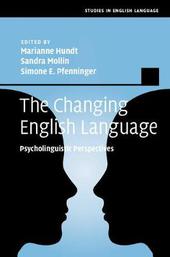
|
The Changing English Language: Psycholinguistic Perspectives
Hardback
Main Details
| Title |
The Changing English Language: Psycholinguistic Perspectives
|
| Authors and Contributors |
Edited by Marianne Hundt
|
|
Edited by Sandra Mollin
|
|
Edited by Simone E. Pfenninger
|
| Series | Studies in English Language |
|---|
| Physical Properties |
| Format:Hardback | | Pages:428 | | Dimensions(mm): Height 235,Width 157 |
|
| Category/Genre | Psycholinguistics
Historical and comparative linguistics |
|---|
| ISBN/Barcode |
9781107086869
|
| Classifications | Dewey:420.19 |
|---|
| Audience | | Professional & Vocational | |
|---|
| Illustrations |
24 Tables, black and white; 26 Line drawings, black and white
|
|
Publishing Details |
| Publisher |
Cambridge University Press
|
| Imprint |
Cambridge University Press
|
| Publication Date |
20 July 2017 |
| Publication Country |
United Kingdom
|
Description
Bringing together experts from both historical linguistics and psychology, this volume addresses core factors in language change from the perspectives of both fields. It explores the potential (and limitations) of such an interdisciplinary approach, covering the following factors: frequency, salience, chunking, priming, analogy, ambiguity and acquisition. Easily accessible, the book features chapters by psycholinguists presenting cutting edge research on core factors and processes and develops a model of how this may be involved in language change. Each chapter is complemented with one or several case study in the history of the English language in which the psycholinguistic factor in question may be argued to have played a decisive role. Thus, for the first time, a single volume provides a platform for an integrated exchange between psycholinguistics and historical linguistics on the question of how language changes over time.
Author Biography
Marianne Hundt is Professor of English Linguistics at Universitat Zurich. Her research interests include grammatical variation and change in World Englishes. As a corpus-linguist, she has compiled and worked with corpora in World Englishes research and historical linguistics. She is the author of English Mediopassive Constructions (2007), co-author of Change in Contemporary English: A Grammatical Study (2009) and co-editor of English World-Wide. Sandra Mollin is senior lecturer in English Linguistics at the Universitat Heidelberg. Her research focuses on phraseology, varieties of English and the combination of corpus linguistic and psycholinguistic methodology. She is the author of The (Ir)Reversibility of English Binomials (2014) and Euro-English: Assessing Variety Status (2006). Simone E. Pfenninger is Assistant Professor at Universitat Salzburg. Her principal research areas are multilingualism, psycholinguistics and individual differences in second language acquisition, especially in regard to quantitative approaches and statistical methods and techniques for language application in education. She is the co-editor of the Second Language Acquisition book series for Multilingual Matters.
Reviews'This innovative collection sketches what a long overdue cooperation of psycholinguistics and language change could look like. By systematically investigating key psycholinguistic factors from both perspectives, it closes a striking gap in historical linguistics.' Lieselotte Anderwald, Christian-Albrechts-Universitat zu Kiel 'This is an admirable example of how a sophisticated analysis of a narrowly defined and partly even invisible phenomenon can reveal deep insights into language acquisition, with wide-ranging consequences for syntactic theory. As such, it is also a demonstration of how acquisition research can inform grammatical theory. Beautifully written, this book is therefore highly recommended to a readership not only interested in language acquisition but also in syntactic theory.' Jurgen Meisel, Universitat Hamburg 'Each chapter in this book provides many research ideas for different scholars in any linguistics field like corpus linguistics, psycholinguistics, TESOL, etc. both theoretically and empirically. These research ideas can help flourish these two disciplines much better and establish a fully interdisciplinary field.' Pouya Vakili, LINGUIST List
|